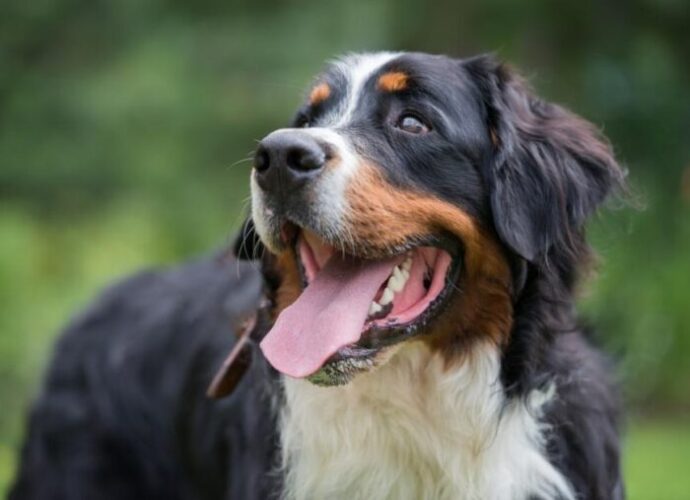The Bernese Mountain Dog is a gentle giant that makes a wonderful family pet. These large, good-natured dogs with their distinctive tricolor coats can bring years of joy and companionship. However, Berners do face higher than average odds of developing hip dysplasia, a painful degenerative joint disease. As a responsible Bernese owner, it’s crucial that you educate yourself on the signs of canine hip problems so you can get your dog timely veterinary care. In this article we talk about Bernese Mountain Dog Health Guide-Symptoms of Canine Hip Dysplasia.
Table of Contents
What is Canine Hip Dysplasia?
Hip dysplasia is an inherited orthopedic disorder that occurs in fast-growing large and giant dog breeds. It stems from abnormal development of the hip joints, causing instability, wear and inflammation of the joints over time. Eventually, arthritis sets in as well. The condition can occur in one or both rear hips. According to the Orthopedic Foundation for Animals (OFA), hip dysplasia afflicts around 20% of Bernese Mountain Dogs.
In mild cases, dogs may exhibit no outward signs of discomfort. More commonly though, the progressive joint degeneration leads to chronic pain, mobility issues and loss of muscle mass in the hips and thighs. Without intervention, hip dysplasia can greatly diminish a Berner’s quality of life. The severity ranges widely, from intermittent lameness to complete disability.
Symptoms of Canine Hip Dysplasia
Caught early, hip dysplasia may be managed conservatively to minimize pain and delay the progression. So it’s vital Berner owners know what red flags to look for. Symptoms typically start presenting between 5 months and 2 years as the joints deteriorate. Warning signs include:
- Difficulty standing up, lying down or climbing
- Reluctance to run, jump or go upstairs
- Bunny-hopping gait (both back legs moving in unison)
- Swaying hindquarters, wobbly gait or limping
- Narrow stance with hind legs closer together
- Muscle loss in back legs and buttocks
- Grating or popping sounds from hip joints
- Lagging behind on walks, tiring easily
- General stiffness, reduced activity level
If your Bernese Mountain Dog shows any of these signs, have your vet examine them promptly. The earlier hip dysplasia is confirmed, the better the outlook with treatment. Your vet will diagnose the condition through a physical exam plus x-rays to assess joint laxity and arthritis. They’ll then recommend an appropriate treatment plan based on your dog’s age, symptoms and lifestyle.
Treatment Options for Canine Hip Dysplasia
Though incurable, a variety of medical and surgical therapies can help relieve your Bernese Mountain Dog’s hip dysplasia. Some options your vet might suggest include:
- Weight management – Keeping lean takes pressure off joints
- Exercise moderation – Low-impact activity avoids overexertion
- Physical therapy – Stretches and exercises to retain muscle tone and flexibility
- Joint supplements – Chondroitin, glucosamine and omega-3s support cartilage and joint health
- Anti-inflammatory medication – To control pain and inflammation
- Rehabilitation therapy – Therapeutic exercises plus modalities like cold laser therapy
- Surgical options – Femoral head ostectomy or total hip replacement are last resorts for severe dysplasia
The treatment regimen your vet maps out will depend on your Bernese’s age, condition, and lifestyle. Following their prescribed plan is key to preserving your dog’s mobility and comfort. With a customized management approach, many dogs with hip dysplasia can enjoy several good years.
As a Berner owner, stay alert to subtle changes in your best friend’s gait, activity level or behavior that may indicate hip trouble. Catching dysplasia early on gives your dog the best prognosis. Working closely with your vet provides the greatest chance of minimizing pain and delaying arthritis. With conscientious care and treatment, your beloved Bernese Mountain Dog can continue brightening your days for years to come. I sincerely hope you find this “Bernese Mountain Dog Health Guide-Symptoms of Canine Hip Dysplasia” article helpful.


